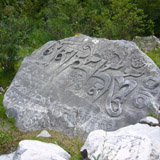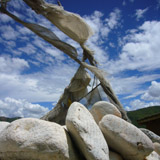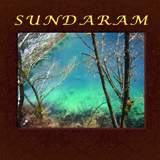
1. Om Mani Padme Hum
 The book Om Mani Padme Hum wants to share an experience happened during a journey in Tibet when, along the ancient path walked 1200 years ago by a Chinese princess (Weng-Chen) who contributed much to the spreading of Buddhism in Tibet, suddenly we find ourselves in an area, about 8 kilometers long, where all the rocks, from the smallest pebble to the mountain walls, to the vast caves, to the rocks in the river, are all carved with the mantra Om Mani Padme Hum. Thousands and thousands of them... The place is charged with an amazing strong vibe and atmosphere, ...we were drowned into the sound of this mantra....we walked and walked breathing it... it was echoing from everywhere, from the space, the earth, the river, the mountains....
The book Om Mani Padme Hum wants to share an experience happened during a journey in Tibet when, along the ancient path walked 1200 years ago by a Chinese princess (Weng-Chen) who contributed much to the spreading of Buddhism in Tibet, suddenly we find ourselves in an area, about 8 kilometers long, where all the rocks, from the smallest pebble to the mountain walls, to the vast caves, to the rocks in the river, are all carved with the mantra Om Mani Padme Hum. Thousands and thousands of them... The place is charged with an amazing strong vibe and atmosphere, ...we were drowned into the sound of this mantra....we walked and walked breathing it... it was echoing from everywhere, from the space, the earth, the river, the mountains....
In this book I have put, here and there, together with the images, some quotes from Osho about the mantra Om Mani Padme Hum, enhancing that remembrance, that beauty, that understanding, with His unique and poetic way.
The book is a sharing of those moments, of a world that still exists, outside and inside, and also want to be a way to support Tibet. Few years ago we have started the building of a monastery, a school, and a small medical center, and all the income from the books will go to help those projects. The monastery is located near Yu-Shu, a Tibetan province in Kham, Qinghai, North Tibet.
The book is born out of the love and deep connection with the Tibetan world.
"The only country in the world who has devoted all his genius to the inner exploration is Tibet.... Tibet is the only country in the world who has worked with all his genius and all his intelligence, searching for the inner and its treasures.... Throughout its history it was an inner pilgrimage. Nowhere there has been such a concentrated effort to discover the being in the human being.... Over the centuries have been created thousands of ways to make your inner lotus blossom, and find your greatest treasure.... The whole world will benefit from their experience. And the world will need their experience." Osho
2. Tashi Delek
 The book Tashi Delek is divided in 8 chapters; there are only images and a short sentence as an introduction to each chapter. I felt that the pictures speak by themselves; they witness an outside world which reflects also an inner world and a deep understanding of it. They are "Landscape of the spirit". The SKY, the LANDSCAPE, the TEMPLE, the PEOPLE, and so on, illustrate an intimate relationship between the Tibetan universe and the profound connection of its people with it .
The book Tashi Delek is divided in 8 chapters; there are only images and a short sentence as an introduction to each chapter. I felt that the pictures speak by themselves; they witness an outside world which reflects also an inner world and a deep understanding of it. They are "Landscape of the spirit". The SKY, the LANDSCAPE, the TEMPLE, the PEOPLE, and so on, illustrate an intimate relationship between the Tibetan universe and the profound connection of its people with it .
At the beginning there is a poem from Zhu-Wang Cai-Kun Rinpoche on Tashi Delek (the common greeting in Tibet), and a poem from me, written about 30 years ago after a deep insight experience in Delphi, Greece.
The book is a sharing of many journeys in Tibet, of a world that still exists, outside and inside. It wants also to be a way to support Tibet.
Few years ago we have started the building of a monastery, a school, and a small medical center, and all the income from the books will go to help those projects.
The monastery is located near Yu-Shu, a Tibetan province in Kham, Qinghai, North Tibet.
3. Sundaram
 There is a region in Tibet called Jiuzhaigou ("Nine Village Valley" ), located in the Min Shan mountain range, Northern Sichuan. It is known for its fabled blue and green lakes, spectacular waterfalls, mountain peaks, ...for its great beauty. But when we reached there we were simply overwhelmed, blown away, by an out of this world beauty. It was just a fairy land, which no words can describe it.
There is a region in Tibet called Jiuzhaigou ("Nine Village Valley" ), located in the Min Shan mountain range, Northern Sichuan. It is known for its fabled blue and green lakes, spectacular waterfalls, mountain peaks, ...for its great beauty. But when we reached there we were simply overwhelmed, blown away, by an out of this world beauty. It was just a fairy land, which no words can describe it.
I was inspired by it to create this small book. "Sundaram"is a Sanskrit word meaning"Beauty", not just in the ordinary sense, but rather as a door to the transcendental.
The book is a collection of images which, through the outer beauty of nature, can give us a glimpse of the unspeakable divine nature of existence. Few poems contribute to it.